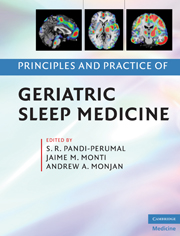Book contents
- Principles and Practice of Geriatric Sleep Medicine
- Principles and Practice of Geriatric Sleep Medicine
- Copyright page
- Dedication
- Contents
- Contributors
- Foreword
- Preface
- Credits and acknowledgments
- Organization of the first edition
- About the editors
- Part 1 Sleep and normal aging
- Part 2 Neuroendocrine and homeostatic changes in the elderly
- Part 3 Sleepdisorders in the elderly
- 11 Assessment and differential diagnosis of sleep disorders in the elderly
- 12 Circadian rhythm dysregulation in the elderly: advanced sleep phase syndrome
- 13 Circadian rhythm dysregulation in the elderly: shift work
- 14 Nocturia in the aging population
- 15 Sleep and fibromyalgia in the elderly
- 16 Sleep and pain management in the elderly
- 17 Effect of depression and anxiety on sleep in the elderly
- 18 Sleep in Parkinson’s disease
- 19 Sleep and circadian rhythm disturbances in Alzheimer’s disease
- 20 Narcolepsy in the elderly
- 21 Movement disorders in the elderly
- 22 REM sleep behavior disorder in the elderly
- 23 Sleep apnea in the elderly
- 24 Sleep and cardiovascular diseases in the elderly
- 25 Insomnia in the elderly
- 26 Sleep in nursing home residents
- 27 Fatigue and sleepiness in the elderly: risk factors and management strategies
- 28 Sleep and falls in the elderly
- 29 Dreaming and dreaming disorders in the elderly
- 30 Sleep medication and traffic safety in the elderly
- Part 4 Treatment of sleep disorders in the elderly
- Index
11 - Assessment and differential diagnosis of sleep disorders in the elderly
from Part 3 - Sleepdisorders in the elderly
Published online by Cambridge University Press: 04 August 2010
- Principles and Practice of Geriatric Sleep Medicine
- Principles and Practice of Geriatric Sleep Medicine
- Copyright page
- Dedication
- Contents
- Contributors
- Foreword
- Preface
- Credits and acknowledgments
- Organization of the first edition
- About the editors
- Part 1 Sleep and normal aging
- Part 2 Neuroendocrine and homeostatic changes in the elderly
- Part 3 Sleepdisorders in the elderly
- 11 Assessment and differential diagnosis of sleep disorders in the elderly
- 12 Circadian rhythm dysregulation in the elderly: advanced sleep phase syndrome
- 13 Circadian rhythm dysregulation in the elderly: shift work
- 14 Nocturia in the aging population
- 15 Sleep and fibromyalgia in the elderly
- 16 Sleep and pain management in the elderly
- 17 Effect of depression and anxiety on sleep in the elderly
- 18 Sleep in Parkinson’s disease
- 19 Sleep and circadian rhythm disturbances in Alzheimer’s disease
- 20 Narcolepsy in the elderly
- 21 Movement disorders in the elderly
- 22 REM sleep behavior disorder in the elderly
- 23 Sleep apnea in the elderly
- 24 Sleep and cardiovascular diseases in the elderly
- 25 Insomnia in the elderly
- 26 Sleep in nursing home residents
- 27 Fatigue and sleepiness in the elderly: risk factors and management strategies
- 28 Sleep and falls in the elderly
- 29 Dreaming and dreaming disorders in the elderly
- 30 Sleep medication and traffic safety in the elderly
- Part 4 Treatment of sleep disorders in the elderly
- Index
Summary
Keywords
- Type
- Chapter
- Information
- Principles and Practice of Geriatric Sleep Medicine , pp. 123 - 130Publisher: Cambridge University PressPrint publication year: 2009

